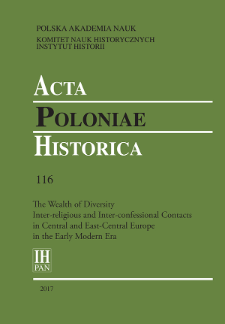- Search in all Repository
- Literature and maps
- Archeology
- Mills database
- Natural sciences
Advanced search
Advanced search
Advanced search
Advanced search
Advanced search

Object
Title: Court Chapels in Saxony between 1697 and 1733: Augustus II the Strong between Catholicism and Protestantism
Subtitle:
Acta Poloniae Historica T. 116 (2017) ; The Wealth of Diversity Inter-religious and Inter-confessional Contacts in Central and East-Central Europe in the Early Modern Era
Contributor:
Hyatt, Francesca : Ed. ; Institute of History of the Polish Academy of Sciences ; Polish National Historical Committee
Publisher:
Instytut Historii Polskiej Akademii Nauk
Place of publishing:
Description:
Type of object:
Abstract:
When Augustus II the Strong (1670–1733) converted from the Protestant to the Catholic confession, he guaranteed his subjects – all Lutheran – the free exercise of their religion and belief. He also respected their wish not to allow the ‘new’ old confession emerge too overtly in the motherland of Martin Luther and the Reformation. Consequently, the Catholic chapels he built during his reign in Saxony were constructed in private in order to assure the peaceful co-existence of the confessions. What may appear to be a tolerant religious policy was in fact almost the contrary: This article will briefly illuminate the historical and political background of Augustus’ decisions, while the main focus will be to examine the newly installed Catholic court chapels.
References:
Christ Günther, ‘Fürst, Dynastie, Territorium und Konfession’, Saeculum, xxiv (1973), 367–87.
Finger Birgit, ‘Die Schlosskapelle von Pillnitz’, Jahrbuch der Staatlichen Schlösser, Burgen und Gärten in Sachsen, vi (1998), 60–74.
Fitschen Klaus, ‘Der Glaubenswechsel Augusts des Starken im Spannungsfeld toleranzund konfessionspolitischer Probleme’, in Frank-Lothar Kroll and Hendrik Thoß (eds.), Zwei Staaten, eine Krone. Die polnisch-sächsische Union 1697–1763 (Berlin, 2016), 165–74.
Gierowski Józef A., ‘Personaloder Realunion?’, in Johannes Kalisch and Józef A. Gierowski, Um die polnische Krone. Sachsen und Polen während des Nordischen Krieges 1700–1721 (Berlin, 1962), 254–91.
Gierowski Józef A., ‘Die sächsisch-polnische Personalunion als Problem des Monarchen aus polnischer Sicht’, in Rex Rexheuser (ed.), Die Personalunionen von Sachsen-Polen 1697–1763 und Hannover-England 1714–1837 (Wiesbaden, 2005), 121–52.
Hartmann Hans-Günther, Moritzburg. Schloß und Umgebung in Geschichte und Gegenwart (Weimar, 1990).
Kretschmann Iris, Schlosskapelle Moritzburg (München, 1991).
Magirius Heinrich, Die evangelische Schlosskapelle zu Dresden aus kunstgeschichtlicher Sicht (Altenburg, 2009).
Meier Esther, Sakralkunst am Hof zu Dresden. Kontext als Prozess (Berlin, 2015).
Mitzscherlich Birgit, ‘Der Neubeginn des Katholizismus in Leipzig im 18. Jahrhundert’, in Enno Bünz (ed.), Das religiöse Leipzig (Leipzig, 2013), 237–55.
Saft Paul F., Der Neuaufbau der katholischen Kirche in Sachsen im 18. Jahrhundert (Leipzig, 1961).
Seifert Siegfried, Niedergang und Wiederaufstieg der katholischen Kirche in Sachsen (Leipzig, 1964).
Staszewski Jacek, ‘Begründung und Fortsetzung der Personalunion Sachsen-Polen 1697 und 1733’, in Rex Rexheuser (ed.), Die Personalunionen von Sachsen-Polen 1697–1763 und Hannover-England 1714–1837 (Wiesbaden, 2005), 37–50.
Staszewski Jacek, ‘Die unterbrochene sächsisch-polnische Union nach dem Frieden von Altranstädt und vor Wiederkehr Augusts II. auf den polnischen Thron (1706–1709)’, in Jürgen R. Wolf (ed.), 1707–2007 Altranstädter Konvention. Ein Meilenstein religiöser Toleranz in Europa (Halle, 2008), 51–7.
Tazbir Janusz, Geschichte der polnischen Toleranz (Warszawa, 1977).
Vötsch Jochen, Kursachsen, das Reich und der mitteldeutsche Raum zu Beginn des 18. Jahrhunderts (Frankfurt, 2003).
Relation:
Volume:
Start page:
End page:
Detailed Resource Type:
Format:
Resource Identifier:
oai:rcin.org.pl:68566 ; 0001-6829 ; 10.12775/APH.2017.116.04
Source:
IH PAN, sygn. A.295/116 Podr. ; IH PAN, sygn. A.296/116 ; click here to follow the link
Language:
Rights:
Creative Commons Attribution BY-ND 4.0 license
Terms of use:
Copyright-protected material. [CC BY-ND 4.0] May be used within the scope specified in Creative Commons Attribution BY-ND 4.0 license, full text available at: ; -
Digitizing institution:
Institute of History of the Polish Academy of Sciences
Original in:
Library of the Institute of History PAS
Projects co-financed by:
Access:
Object collections:
- Digital Repository of Scientific Institutes > Partners' collections > Institute of History PAS > Serials
- Digital Repository of Scientific Institutes > Partners' collections > Institute of History PAS > Institute Publications
- Digital Repository of Scientific Institutes > Partners' collections > Institute of History PAS > Institute Publications > Journals
- Digital Repository of Scientific Institutes > Partners' collections > Institute of History PAS > Institute Publications > Journals > Acta Poloniae Historica
- Digital Repository of Scientific Institutes > Literature > Journals/Articles
Last modified:
Sep 22, 2023
In our library since:
Feb 18, 2019
Number of object content downloads / hits:
397
All available object's versions:
https://rcin.org.pl/publication/85770
Show description in RDF format:
Show description in RDFa format:
Show description in OAI-PMH format:
Objects Similar
Kosińska, Urszula
Kosińska, Urszula
Kosińska, Urszula
Kriegseisen, Wojciech (1955– )
Bela, Zbigniew (1949– )
Kosińska, Urszula

 INSTYTUT ARCHEOLOGII I ETNOLOGII POLSKIEJ AKADEMII NAUK
INSTYTUT ARCHEOLOGII I ETNOLOGII POLSKIEJ AKADEMII NAUK
 INSTYTUT BADAŃ LITERACKICH POLSKIEJ AKADEMII NAUK
INSTYTUT BADAŃ LITERACKICH POLSKIEJ AKADEMII NAUK
 INSTYTUT BADAWCZY LEŚNICTWA
INSTYTUT BADAWCZY LEŚNICTWA
 INSTYTUT BIOLOGII DOŚWIADCZALNEJ IM. MARCELEGO NENCKIEGO POLSKIEJ AKADEMII NAUK
INSTYTUT BIOLOGII DOŚWIADCZALNEJ IM. MARCELEGO NENCKIEGO POLSKIEJ AKADEMII NAUK
 INSTYTUT BIOLOGII SSAKÓW POLSKIEJ AKADEMII NAUK
INSTYTUT BIOLOGII SSAKÓW POLSKIEJ AKADEMII NAUK
 INSTYTUT CHEMII FIZYCZNEJ PAN
INSTYTUT CHEMII FIZYCZNEJ PAN
 INSTYTUT CHEMII ORGANICZNEJ PAN
INSTYTUT CHEMII ORGANICZNEJ PAN
 INSTYTUT FILOZOFII I SOCJOLOGII PAN
INSTYTUT FILOZOFII I SOCJOLOGII PAN
 INSTYTUT GEOGRAFII I PRZESTRZENNEGO ZAGOSPODAROWANIA PAN
INSTYTUT GEOGRAFII I PRZESTRZENNEGO ZAGOSPODAROWANIA PAN
 INSTYTUT HISTORII im. TADEUSZA MANTEUFFLA POLSKIEJ AKADEMII NAUK
INSTYTUT HISTORII im. TADEUSZA MANTEUFFLA POLSKIEJ AKADEMII NAUK
 INSTYTUT JĘZYKA POLSKIEGO POLSKIEJ AKADEMII NAUK
INSTYTUT JĘZYKA POLSKIEGO POLSKIEJ AKADEMII NAUK
 INSTYTUT MATEMATYCZNY PAN
INSTYTUT MATEMATYCZNY PAN
 INSTYTUT MEDYCYNY DOŚWIADCZALNEJ I KLINICZNEJ IM.MIROSŁAWA MOSSAKOWSKIEGO POLSKIEJ AKADEMII NAUK
INSTYTUT MEDYCYNY DOŚWIADCZALNEJ I KLINICZNEJ IM.MIROSŁAWA MOSSAKOWSKIEGO POLSKIEJ AKADEMII NAUK
 INSTYTUT PODSTAWOWYCH PROBLEMÓW TECHNIKI PAN
INSTYTUT PODSTAWOWYCH PROBLEMÓW TECHNIKI PAN
 INSTYTUT SLAWISTYKI PAN
INSTYTUT SLAWISTYKI PAN
 SIEĆ BADAWCZA ŁUKASIEWICZ - INSTYTUT TECHNOLOGII MATERIAŁÓW ELEKTRONICZNYCH
SIEĆ BADAWCZA ŁUKASIEWICZ - INSTYTUT TECHNOLOGII MATERIAŁÓW ELEKTRONICZNYCH
 MUZEUM I INSTYTUT ZOOLOGII POLSKIEJ AKADEMII NAUK
MUZEUM I INSTYTUT ZOOLOGII POLSKIEJ AKADEMII NAUK
 INSTYTUT BADAŃ SYSTEMOWYCH PAN
INSTYTUT BADAŃ SYSTEMOWYCH PAN
 INSTYTUT BOTANIKI IM. WŁADYSŁAWA SZAFERA POLSKIEJ AKADEMII NAUK
INSTYTUT BOTANIKI IM. WŁADYSŁAWA SZAFERA POLSKIEJ AKADEMII NAUK


































